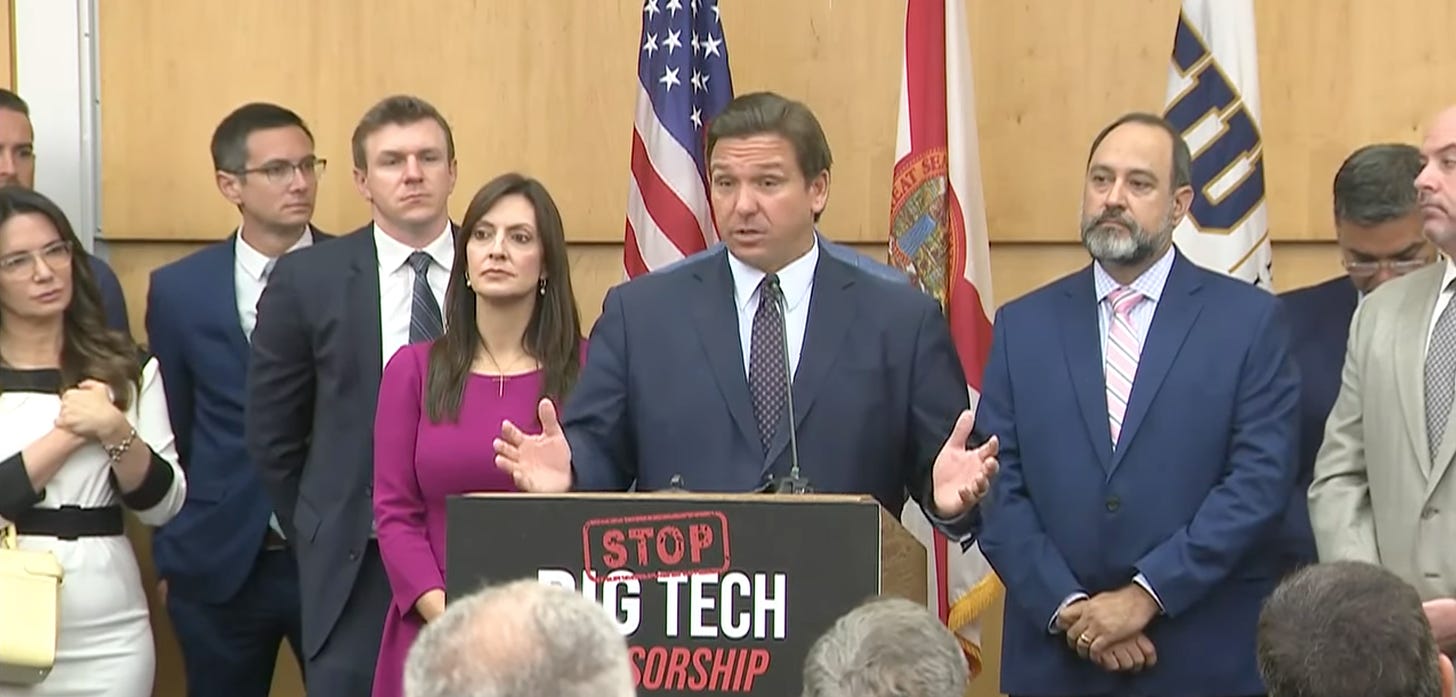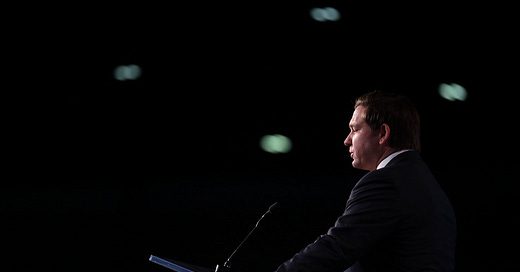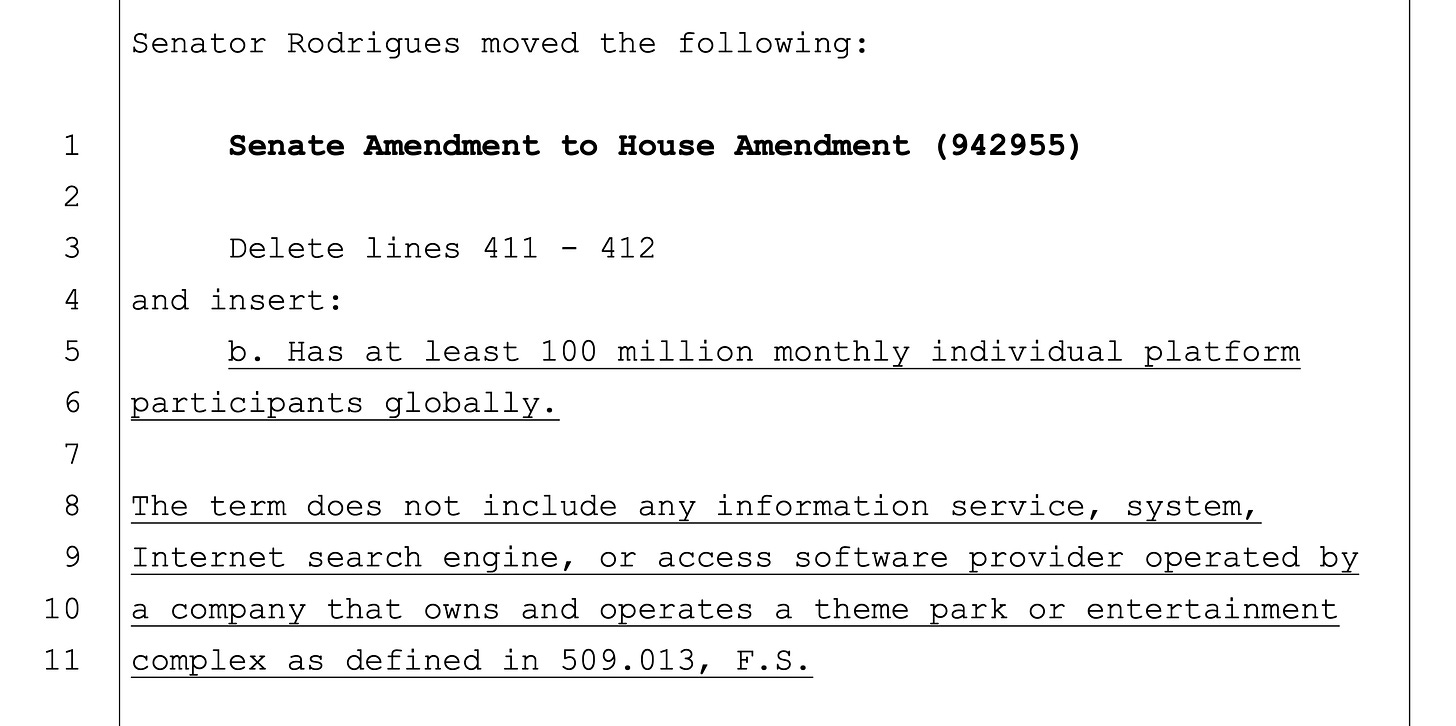Ron DeSantis risked selling out his Republican base to help Disney
Getting tough on 'Big Tech oligarchs'....as long as they don't own a theme park.

This is Seeking Rents, a newsletter devoted to producing original journalism — and lifting up the journalism of others — that examines the many ways that businesses influence public policy across Florida, written by Jason Garcia.
The email landed at 8 p.m. with just two days remaining in the Florida Legislature’s 2021 session.
“Please call,” Stephanie Kopelousos, one of Florida Gov. Ron DeSantis’ top aides, wrote to a pair of staffers in the Florida House of Representatives.
It’s not clear if they talked. But 21 minutes later, emails show, Kopelousos sent the two House staffers a proposal to carve a last-minute exemption into one of the governor’s top priorities that session: A bill to crack down “on Big Tech oligarchs” allegedly censoring right-wing viewpoints on social media.
It was the start of a 24-hour, late-session scramble that saw half a dozen top officials in the governor’s office and House working late into the night, trying frantically to rewrite DeSantis’ prized piece of legislation — all to accommodate one company.
Disney.
The legislation (SB 7072) exposed social-media companies such as Facebook and Twitter to the threat of civil lawsuits and state investigations. But the bill — which DeSantis and lawmakers had been working on for at least three months — was written in such a way that it also exposed the Walt Disney Co. because its Disney+ streaming service met the proposed definition of a “social media platform.”
So Disney apparently raised a last-minute objection. And the DeSantis administration leapt into action.
Kopelousos is the governor’s legislative affairs director, meaning she serves as the governor’s primary point of contact with the Legislature. But emails show she became Disney’s point of contact, too, as she repeatedly passed along potential exemptions to the bill that were apparently written by Disney lobbyists.
In one email to the other governor’s office and House staffers, Kopelousos sent a proposal under the subject line, “Latest from Disney.” A few hours later, after other staffers expressed concern that idea was too broad, she sent in another attempt, which she explained with the note, “Disney responded with this.”
An hour later, Kopelousos emailed a third possibility. The subject line was “New Disney language,” and the language, she told the others, came “From Adam,” presumably a reference to a Disney lobbyist named Adam Babington.
The other staffers working to accommodate Disney — including DeSantis’ general counsel and his budget director — appeared focused on trying to find a narrow solution that didn’t create a loophole other companies could exploit. They consistently pushed back against Disney’s suggestions and countered with tighter alternatives.
“So Disney is a journalistic enterprise now?” Kurt Hamon, the staff director for the House Commerce Committee, wrote in response to of the company’s ideas. “I would say no to this one too...why would we [exempt] journalism enterprises? Would Google, Facebook and Twitter qualify as a journalistic enterprise?”
“If they have a problem with Kurt’s narrow suggestion, then they are probably doing or seeking to do more than they have indicated,” James Utheier, who was DeSantis’ general counsel and is now the governor’s chief of staff, wrote in response to another.
With the clock winding down, Disney, DeSantis and legislative leaders eventually dropped any attempt at sophistication and went with a much blunter solution.
Moments before passing the bill for good, the Florida Senate added an amendment to the bill. That amendment created an exemption to the new rules for any social media platform owned by a company that also owns a theme park.
The Senate managed to sneak the amendment through without ever explaining what it did. (More on that at the end.)
But the absurdity of this approach was exposed on the floor of the Florida House, which passed the rewritten, and presumably Disney-approved, bill two hours later.
The bill’s sponsor, Tampa-area Republican Rep. Blaise Ingoglia, said the amendment was “just to make sure that Disney+ isn’t caught up in this.” That prompted a few questions.
“If Facebook buys a theme park, does that prevent us from being able to regulate what happens on Facebook?” asked Rep. Andrew Learned, a Tampa-area Democrat.
Ingoglia responded, “So, if they bought a theme park and named it Zuckerland and they met the definition of a theme park under Florida statute, then the answer to that would be yes.”
Makes sense.
Look, on one level, you can argue that this is just an amusing-but-ultimately-harmless example of The Way Things Work in Tallahassee when a giant corporation like Disney — which made roughly $5 million in campaign contributions during the 2020 elections — has an objection to a bill.
Obviously, the point of this legislation was to stop companies like Facebook and Twitter from doing things like suspending Donald Trump’s accounts or deleting posts that might incite an insurrection. Nobody was worried about how Disney was moderating the comments section of Disney+. (Although you might ask yourself here whether DeSantis and legislative leaders would be so committed to addressing your concerns if you ever get inadvertently caught up in one of their priority pieces of legislation.)
But this actually matters. States can’t write laws that irrationally discriminate in favor of one person or company over another. There’s a whole clause in the U.S. Constitution about this.
Ron DeSantis’ willingness to give Disney an incoherent carveout from this bill raises real questions about whether the governor really cared about cracking down on Big Tech — or whether he just cared about making voters think he’d cracked down on Big Tech.

Because here’s what happened after the signing ceremony: Trade groups representing a bunch of tech companies sued to block the law. And one of their key arguments was that the law included an unconstitutional “protectionist carveout” for a couple of politically influential companies: Disney and Comcast Corp., the owner of Universal Orlando and the Peacock streaming service.
“No legitimate government interest could be advanced by such an exemption, nor was any such interest identified,” lawyers for the tech companies wrote in their complaint. “The decision to exempt those major companies confirms that the law’s true objective is to control the private speech of politically disfavored companies who have online platforms, but not to control the speech of similarly situated but politically favored companies with power and influence in the State of Florida.”
U.S. District Judge Robert Hinkle agreed. He specifically cited the theme-park exemption as one of the reasons he granted a temporary injunction that prevents the state of Florida from enforcing DeSantis’ new law.
“Despite the obvious constitutional issue posed by the exclusion, the Legislature adopted it, apparently unwilling to subject favored Florida businesses to the statutes’ onerous regulatory burden,” Hinkle wrote in his ruling.
That injunction is still in place. In other words, in part because Florida leaders didn’t want to upset Disney, they aren’t really upsetting Big Tech. At least not with this law.
That doesn’t stop DeSantis from boasting about it, of course.
“A free society requires the ability to have robust discussions about issues of public importance. And yet, today, Big Tech companies that control so much of the discourse have used their platforms to elevate preferred narratives and to stifle dissent, serving as a de facto council of censors,” he said last month during his opening day address to the Legislature. “Now, Florida was the first state to legislate protections for its citizens, and we need to build off what we did last session.”
This kind of symbolism-over-substance is a recurring issue in Tallahassee — particularly when it comes to issues that pit the Republican voting base against the corporate donor class.
There’s probably no better example of this than DeSantis’ “E-Verify” law, which the governor has touted as proof of his tough-on-illegal-immigration approach to governing but which exempts the vast majority of businesses — including the agriculture industry, where an estimated 50 percent to 70 percent of farm workers are unauthorized. Even Florida’s most far-right legislator called it a “fake bill” and “window dressing.”
Then there’s the governor’s other “Big Tech” talking point: A bill that would have imposed aggressive new data privacy rules on businesses, including giving people the right to sue companies that don’t do enough to prevent data breaches. This was, at least publicly, one of DeSantis’ priority bills last year, too. And it had widespread, bipartisan support, passing the Florida House on a 118-1 vote.
Yet somehow, this was the one DeSantis priority that legislative leaders just couldn’t get across the finish line last session. Maybe that had something to do with the fact that the bill was “intensely loathed by by big businesses.”
This is something to keep an eye on this session, too, with DeSantis and legislative leaders ostensibly standing up to the business lobby with bills like the governor’s “Stop W.O.K.E. Act,” which would potentially expose employers to lawsuits if they have training programs that teach concepts like anti-racism.
The data-privacy bill is back, too, though it has yet to get a hearing.
Or how about the governor’s latest tough-on-immigration pledge to block contracts for companies....that don’t actually have state contracts?
Sometimes, they’re legislating. But other times, they’re just acting.
Postscript: Did Florida Senate leaders lie?
Lie is one of those tricky words to use, because you can’t look into someone’s mind to see if they were being intentionally untruthful.
So I’ll leave it up to you to decide if Senate leaders lied about this Disney amendment.
Here’s what happened. The Senate had already passed this bill once, but the House amended it and sent the bill back.
So the Senate had to take it up a second time. This is when they decided to insert the Disney amendment.
The Senate bill sponsor, Sen. Ray Rodrigues, a Republican from southwest Florida, gave his fellow senators a pretty detailed explanation of how the House had amended the bill. But then when it came time to explain the Senate’s new amendment — the carveout for Disney — he managed to skip right past it.

Senate President Wilton Simpson: “Read Senate amendment barcode 811008.” [Note: This is the Disney amendment]
Simpson: “Sen. Rodrigues, was the amendment you just described that amendment or would you like to describe this amendment?
Sen. Ray Rodrigues: “That was the amendment I described.” [Narrator: It was not.]
Simpson: “That was our amendment . [It was not.] So is there any discussion or debate or questions on the amendment?”
*Confused pause*
Sen. Perry Thurston: “I just had a question: The amendment — did we get an explanation…? [You did not.] Maybe I missed that.” [You did not.]
Simpson: “Sen. Rodrigues explained the amendment. [He did not.] The amendment that he explained was this amendment.” [It was not.]
That was it. Somehow, the Senate managed to get this Disney amendment on the bill withtout saying a single substantive word about it.
You don’t have to take my word for this. You can watch the whole sequence yourself at this link (the sequence starts at 5:45).
It won’t take long. The whole “discussion” is less than three minutes.
Contact: Garcia.JasonR@gmail.com







